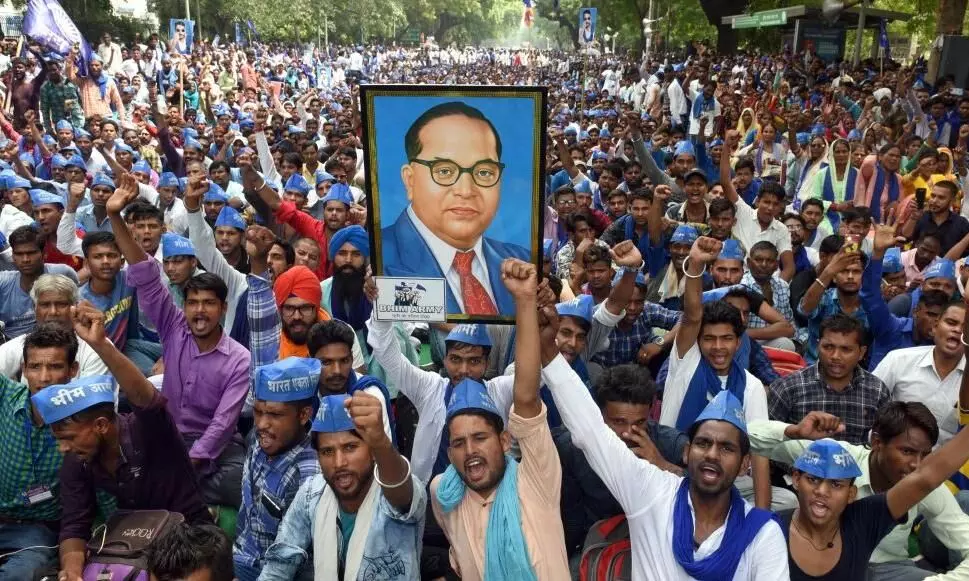
Constitution under threat: Can INDIA harness Dalit discontent in crucial UP?
text_fieldsAs India’s marathon election enters its final stretch with the seventh phase running in Uttar Pradesh, considered crucial for both the BJP and the INDIA alliance, where Congress and the Samajwadi Party led by Akhilesh Yadav share the ground, eyeing the Dalit, minority, and other backward communities.
Unlike in 2014 and 2019, when Hindutva was key to enthusing the public with the BJP raking up the narrative that the Hindus were in danger and the people seemed compliant with the narrative, the BJP emerged as the protector of their faith and a promiser of their future.
As the political weather changed in 2024, most of the backward communities and Dalits who traditionally voted for the BSP and SP and tried their luck with the BJP in 2014 and 2019 felt betrayed by the promises, as they could not find palpable development in their livelihood or in fundamental amenities like health, and social welfare.
Outright anger could be sensed among people, particularly among Dalits and other backward communities whose lives mostly depend on reservations in many welfare schemes that could be jeopardized by the BJP leaders' continued announcements about changing the constitution.
In 2019, the BJP dominated UP by winning 62 out of 80 seats, but the INDIA alliance is hopeful that this time around, a consolidation of Dalit and backward caste votes can tilt the balance in their favour.
Akhilesh Yadav has frequently championed the 'PDA' strategy—an acronym for 'picchda (backward), Dalit, and alpsankhyak (minority)'—aiming to unite these groups under the broader umbrella of 'Bahujan samaj' to catalyze change.
Despite the INDIA alliance’s aspirations, the BJP has historically found support among the Bahujan Samaj, particularly from younger voters enticed by promises of economic betterment and social inclusion. However, the issue of joblessness has cast a long shadow over these promises, fuelling dissatisfaction among this crucial demographic.
For the INDIA alliance to gain ground, it needs to break the BJP’s stronghold on the Other Backward Classes (OBC) and win significant support from Dalits. Dalits constitute about 20.5% of UP's population, a considerable figure compared to the national average of 16.6%.
The political mobilization of Dalits began in earnest with Kanshi Ram’s formation of the Bahujan Samaj Party (BSP) in the late 1980s, which provided a robust political platform for Dalit voices.
The BSP has experienced fluctuating fortunes, from its collaboration with the Samajwadi Party in 1991 to its solo victory in 2007. However, the rise of Hindutva politics since 2014 has marginalized the BSP, culminating in its poor performance in the 2022 state assembly elections, where it secured only 12.88% of the vote and a single MLA seat.
This election cycle, the BSP is not part of the INDIA alliance, raising questions about where its traditional voter base will shift. Mayawati's political manoeuvres, including ambiguous statements regarding the BJP and Congress, strategic seat changes, and side-lining emerging leaders like her nephew Akash Anand, have not gone unnoticed by her supporters. On the ground, there is palpable discontent among Dalits who feel neglected by the current regime and disillusioned by the lack of job opportunities.
Frustration is evident among the Dalit community, who criticize the BJP's prolonged rule for their economic hardships. Former factory workers and small business owners lament the lack of jobs and economic stability, expressing a readiness to support any alternative that promises change. The sentiment is echoed in other Dalit-majority areas, where skepticism towards Mayawati’s recent political stance is balanced by a deep-seated loyalty to the BSP’s historical mission.
Amid conversations under the statue of Dr. B.R. Ambedkar, concerns about the erosion of constitutional protections and the privatization of jobs dominate discussions. Young and old alike express fears about the diminishing opportunities for education and employment, and there is a strong desire for political change.
While older voters remain loyal to the BSP, younger ones see aligning with the INDIA alliance as a pragmatic step to end the BJP’s dominance.
The Dalit vote in UP, historically a steadfast support base for the BSP, is now at a crossroads. The community is grappling with the challenges of aligning traditional loyalties with the pressing need for socio-economic progress. This dynamic is critical as it holds the potential to significantly impact the electoral outcomes in UP and, by extension, the national political landscape.
As UP’s electorate heads to the polls, the outcome hinges on whether the INDIA alliance can successfully harness the discontent among Dalits and backward castes to unseat the BJP from its position of dominance.






















